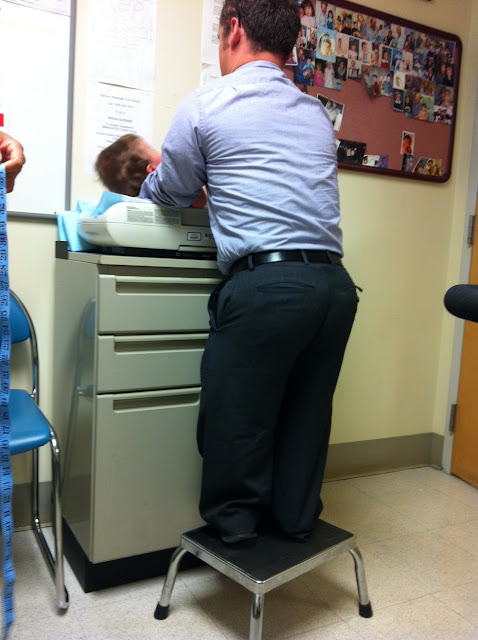by Christina Mills, CFILC's Deputy Director
I’ve been questioning whether it was premature of me to write my first AT Blog post about my daughter’s accessible crib. After I wrote that posting I sat back and developed a list of other AT baby-related topics that I wanted to cover, and when I did I realized that maybe I should have talked about the Assistive Technology I wish I had had for the delivery and my four-day hospital stay.
I’ve been questioning whether it was premature of me to write my first AT Blog post about my daughter’s accessible crib. After I wrote that posting I sat back and developed a list of other AT baby-related topics that I wanted to cover, and when I did I realized that maybe I should have talked about the Assistive Technology I wish I had had for the delivery and my four-day hospital stay.
Those who know me know
that I’m usually well organized and big on planning ahead. I actually do like some surprises,
but some people might question that. I wrote up a detailed birthing plan and shared
it with all of my doctors well in advance, but what I didn’t think about was
all the inaccessible hospital equipment that would make it difficult and nearly
impossible for me to fully relax and enjoy the first few days with my daughter.
For all of you soon-to-be or
hopeful parents with disabilities—take a tour of the delivery room, nursery and
overnight patient rooms before your due date. During your tour think about the
height of the baby bathing area in the nursery, will you be able to participate
in giving your baby his/her first bath? Will you be able to reach your baby
when she’s lying in her bed in the nursery? When the baby is brought into your
room will you be able to get her in and out of the bassinet? I had difficulty
with all of these things and since my husband is also a person with a
disability (short stature) it wasn’t easy for him either.
 |
| We bring our own AT (foot stool) to our daughter's doctor appointments |
In my experience as a new
parent I haven’t had a great deal of time to reflect on things I would do
differently, but contributing to the AT Network Blog has given me this time.
It’s interesting; I work in disability rights and I have done lots of advocacy
around accessible healthcare but, until now, I never thought much about it as a parent with a
disability. I was so used to talking about the lack of accessible scales,
examining tables, mammogram machines, large print, etc. I never gave any
thought to the needs of parents with disabilities and the lack of access or AT
that they could be encountering. And, of course, it isn’t just about the delivery or a
hospital stay. It’s also about all those post birth and “wellness” checkups
and possible emergency visits or stays in the hospital after your baby is born.
We’ve become accustomed to
bringing our own AT to the wellness checkups because the scales for babies are bolted
to tables that are well above my head and also out of my husband’s reach.
Therefore we bring a folding lightweight stool to all of our daughter’s medical
appointments. In fact, we usually just leave that handy stool in the trunk of
our car. Some might be asking why we don’t ask the doctor or nurse to transfer
our daughter on and off the scale. If we requested that accommodation they
would probably do it, but given our daughter's disability we would rather do it
ourselves. Besides, we’re her parents and these are the types of choices we’ve
made as empowered parents with disabilities.

Thank you for all of the tips, especially about the car beds.
ReplyDelete